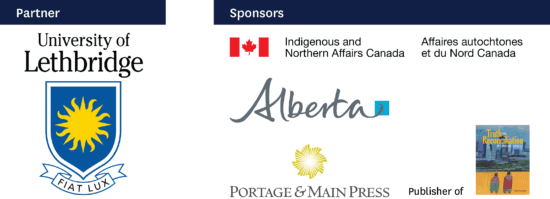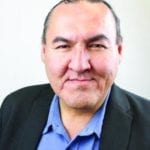Truth & Reconciliation in Every School
You could not attend our event in Lethbridge? stream our panel discussion live into your staffroom.
Watch our panel discussion
This important and timely professional learning session will identify how we can respectfully and accurately incorporate Indigenous perspectives into all aspects of our schools and classrooms, including lessons on the history and legacy of residential schools. Our goal is to begin a dialogue to learn together and build relationships among Blackfoot First Nation Knowledge Keepers, community leaders, and non-Indigenous educators and teaching candidates who are striving to “get this right.”
Key questions that will be explored at this event include:
- Why should educators change their practices, how do we achieve “truth,” and how do we work towards reconciliation? What’s stalling the development of learning objectives that would incorporate all Canadians in the reconciliation process, and how should the TRC’s recommendations evolve education policy?
- How can we develop approaches that are community-specific and respectful of local protocols and practices? How can educators build trusting relationships with Indigenous communities?
- How can schools and post-secondary institutions commit to co-learning about reconciliation throughout the entire school year? How can post-secondary teacher trainers prepare the next generation of educators to value and feel confident in embedding Indigenous perspectives into all grade levels and subject areas?
No matter where you are on your learning journey, this event will equip you with valuable insights that can help you contribute to preparing the next generation of learners who will work collaboratively with Indigenous peoples to advance reconciliation.
Proudly supported by
1:00 PM–1:30 PM (MDT)
OFFICIAL WELCOME
Opening prayer and smudge
Dr. Leroy Little Bear, University of Lethbridge Special Assistant to the President, and Francis First Charger, University of Lethbridge Elder-in-Residence
Honour song
Dr. Leroy Little Bear, University of Lethbridge Special Assistant to the President
Opening Remarks
From Mike Mahon, President of the University of Lethbridge
From Darren Googoo, Director of Education, Membertou Mi’kmaq First Nation and EdCan Network Chair
1:30 PM–2:30 PM (MDT)
Elders’ Circle
Moving Forward By Changing the Conversation
Dr. Leroy Little Bear, University of Lethbridge Special Assistant to the President
I-gimsmi-sa (with care and understanding)
Francis First Charger, University of Lethbridge Elder-in-Residence
2:30 PM–3:00 PM (MDT)
BREAK
Educator Learning Resource Fair
Participants are invited to visit kiosks to obtain Truth and Reconciliation learning resources, books, tools and lesson plans.
- Portage & Main Press, publisher of Truth and Reconciliation in Canadian Schools by Dr. Pamela Rose Toulouse
- University of Lethbridge Bookstore
- J. Charlton Publishing, publisher of Dropping the “T” from CAN’T: Enabling Aboriginal Post-Secondary Academic Success in Science and Mathematics by Dr. Michelle Hogue
- EdCan Network, publisher of Education Canada Magazine
3:00 PM–4:15 PM (MDT)
PANEL DISCUSSION
Truth and Reconciliation in Every Classroom:
What we know, what we don’t know, and what we need to do to move forward respectfully.
Moderated by Dr. Michelle Hogue, Associate Professor, Coordinator of First Nations’ Transition Program University of Lethbridge
Panellists:
- Dr. Pamela Rose Toulouse, Associate Professor at Laurentian University and author of Truth and Reconciliation in Canadian Schools (2018)
- Ira Provost, Cross-Cultural Educator, Blackfoot Guardian, Musician
- Julaine Guitton, Elementary School Teacher – Grade 5/6 and Project Lead, Stavely Elementary School’s ‘Project of Heart’
4:15 PM–4:30 PM (MDT)
CLOSING REMARKS
Round Dance, Honour Song(s)
Led by Dr. Leroy Little Bear
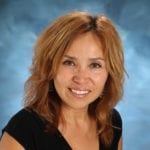 Dr. Pamela Rose Toulouse celebrates 25 years working in K to 12 and Teacher Education. She is a proud Ojibwe/Odawa woman from the community of Sagamok Anishnawbek in Northern Ontario. Pamela has over 50 published resources ranging from books, curriculum documents and other select contributions.
Dr. Pamela Rose Toulouse celebrates 25 years working in K to 12 and Teacher Education. She is a proud Ojibwe/Odawa woman from the community of Sagamok Anishnawbek in Northern Ontario. Pamela has over 50 published resources ranging from books, curriculum documents and other select contributions.
Find out more about her.
Ira Provost is Manager of the Piikani Nation Consultation, Culture and Cultural Programming. He is a graduate student at the University of Lethbridge studying the Truth and Reconciliation Commission and Consultation in Indigenous Communities.
Find out more about him.
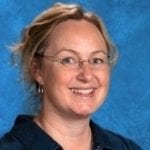 Julaine Guitton was born and raised in Southern Alberta, she is currently in her fourteenth year of teaching with Livingstone Range School Division. She and her husband have two young boys.
Julaine Guitton was born and raised in Southern Alberta, she is currently in her fourteenth year of teaching with Livingstone Range School Division. She and her husband have two young boys.
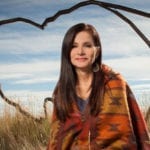 As a person of Métis heritage, an associate professor and Coordinator of the First Nations’ Transition Program at the University of Lethbridge, Michelle Hogue is passionate about enabling Indigenous academic success through early engagement and retention in ways that bridge cultures and attend to Indigenous ways of knowing and learning (IWKL). In her teaching and research, Dr. Hogue sees first-hand the challenges Indigenous students experience in transitioning to and through post-secondary education. No where is this more true than in the sciences and mathematics, current roadblocks to science, technology, engineering and mathematics (STEM)-related disciplines in which Indigenous peoples are grossly under-represented. As such, her teaching and research focus on building bridges between Indigenous and Western ways of knowing and learning using culturally relevant and innovative methodological approaches that blend required curricular and institutional demands with methodological teaching and learning practices such as hands-on-practical and applied learning, land-based learning, narrative, drama and music; ways in that attend to IWKL. Her work is both in community with youth, as well as at the post-secondary level because early and sustained engagement through mentorship is key to retention. Currently her research explores best practices in Canada, Australia and New Zealand to develop an inclusive, culturally responsive teaching practice and curricula through the philosophy of Bridging Cultures: Two-Eyed Seeing for Both Ways Knowing to enable Indigenous academic success.
As a person of Métis heritage, an associate professor and Coordinator of the First Nations’ Transition Program at the University of Lethbridge, Michelle Hogue is passionate about enabling Indigenous academic success through early engagement and retention in ways that bridge cultures and attend to Indigenous ways of knowing and learning (IWKL). In her teaching and research, Dr. Hogue sees first-hand the challenges Indigenous students experience in transitioning to and through post-secondary education. No where is this more true than in the sciences and mathematics, current roadblocks to science, technology, engineering and mathematics (STEM)-related disciplines in which Indigenous peoples are grossly under-represented. As such, her teaching and research focus on building bridges between Indigenous and Western ways of knowing and learning using culturally relevant and innovative methodological approaches that blend required curricular and institutional demands with methodological teaching and learning practices such as hands-on-practical and applied learning, land-based learning, narrative, drama and music; ways in that attend to IWKL. Her work is both in community with youth, as well as at the post-secondary level because early and sustained engagement through mentorship is key to retention. Currently her research explores best practices in Canada, Australia and New Zealand to develop an inclusive, culturally responsive teaching practice and curricula through the philosophy of Bridging Cultures: Two-Eyed Seeing for Both Ways Knowing to enable Indigenous academic success.
Find out more about her.
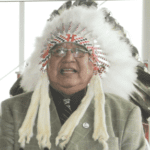 Presently, Francis First Charger serves on several committees: SHIA Housing Committee for the City of Lethbridge since 2004; Lethbridge SHIA Leaders Council; the Cultural Advancement Working Group for the University of Lethbridge, as well as Opokaa’sin on their Elder Committee and Opokaa’sin Board of Director. He also works for the Faculty of Management at the U of L under its Elders’ program since September, 2008.
Presently, Francis First Charger serves on several committees: SHIA Housing Committee for the City of Lethbridge since 2004; Lethbridge SHIA Leaders Council; the Cultural Advancement Working Group for the University of Lethbridge, as well as Opokaa’sin on their Elder Committee and Opokaa’sin Board of Director. He also works for the Faculty of Management at the U of L under its Elders’ program since September, 2008.
Learn more about him.
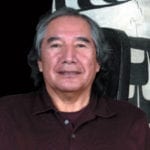 Leroy Little Bear has himself become an institution. This veteran educator and renowned academic is a model for all Aboriginals striving for success in higher learning. The founder of the Native American Studies Department at the University of Lethbridge – where he served as Chair for 21 years – also went on to become the founding Director of Harvard University’s Native American Program.
Leroy Little Bear has himself become an institution. This veteran educator and renowned academic is a model for all Aboriginals striving for success in higher learning. The founder of the Native American Studies Department at the University of Lethbridge – where he served as Chair for 21 years – also went on to become the founding Director of Harvard University’s Native American Program.
Learn more about him.
Truth and Reconciliation in Canadian Schools by Dr. Pamela Rose Toulouse
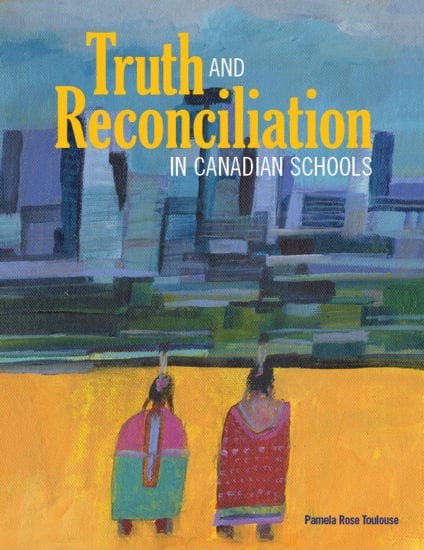 “This book is a remarkable map, guide, and companion for educators about how, when, and where to take the restorative education actions we need. Let’s get together and have some important conversations to change things for the better.”
“This book is a remarkable map, guide, and companion for educators about how, when, and where to take the restorative education actions we need. Let’s get together and have some important conversations to change things for the better.”
Read the book review by Leah Fowler
Carrying the Fire: A Youth Talking Circle on Truth and Reconciliation in our Schools
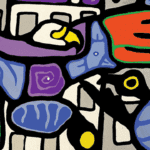 Catch a glimpse into what youth Indigenous leaders think needs to happen in schools as we move forward in a Truth and Reconciliation era.
Catch a glimpse into what youth Indigenous leaders think needs to happen in schools as we move forward in a Truth and Reconciliation era.
An article by Dr. Michelle Hogue and Holly Bennett
Truth and Reconciliation in the Schools: How can we move forward?
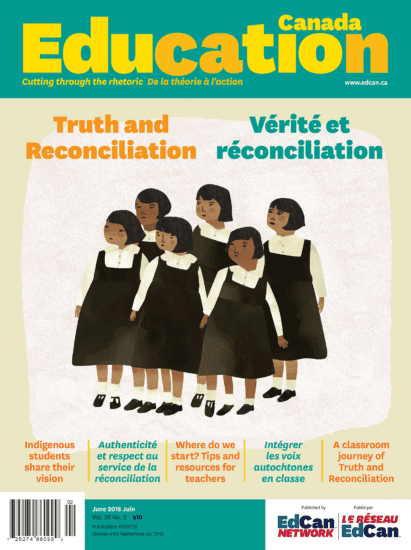 “The transformative changes coming to schools across Canada in the wake of the Truth and Reconciliation Commission’s (TRC) “calls to action” bring lots of opportunity for discussion around key issues.”
“The transformative changes coming to schools across Canada in the wake of the Truth and Reconciliation Commission’s (TRC) “calls to action” bring lots of opportunity for discussion around key issues.”
Find more articles
Reconciliation in Action: Creating a Learning Community for Indigenous Student Success
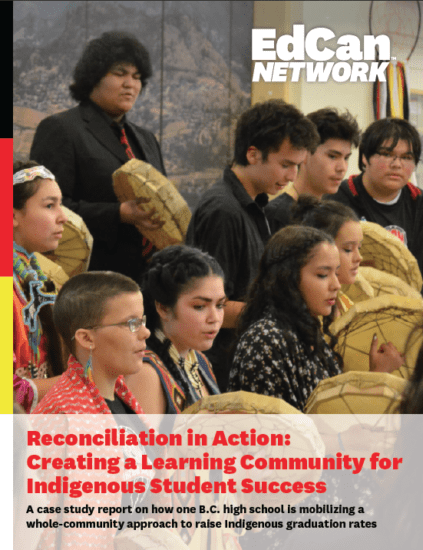 A guide on how urban high schools can raise Indigenous graduation rates.
A guide on how urban high schools can raise Indigenous graduation rates.
Read the case study


